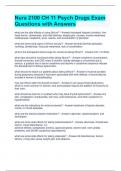Nura 2100 CH 11 Psych Drugs Exam
Questions with Answers
what are the side effects of using lithium? - Answer-increased frequent urination, fine
head tremor, drowsiness, and mild diarrhea, weight gain, nausea, muscle weakness,
restlessness, headache, acne, rashes, and exacerbation of psoriasis
what are some early signs of lithium toxicity? - Answer-several diarrhea episodes,
vomiting, drowsiness, muscular weakness, lack of coordination
what is the therapeutic blood range for someone taking lithium? - Answer-0.8-1.4 mEq/L
what labs should be monitored while taking lithium? - Answer-creatinine concentration,
thyroid hormones, and CBC every 6 months. kidney damage is uncommon,but is
serious. a gradual rise in serum creatinine and decline in creatinine clearance indicate
the development of kidney dysfunction.
what should we teach our patients about taking lithium? - Answer-it must be avoided
during pregnancy because it has been associated with birth defects. it should also be
avoided if woman is breastfeeding.
how can lithium alter the thyroid function? - Answer-it can cause throid dysfunction,
which is more common in women, and some people require the addition of thyroxine to
their care.
what should we look for in a patient who may have thyroid dysfunction? - Answer-dry
skin, constipation, bradycardia, hair loss, cold intolerance, and other symptoms of
hypothroidism
what are the indications for anticonvulsants? - Answer-treatment of bipolar disorder,
mania, or mixed episodes.
what are the anticonvulsants medication? - Answer-valproate, carbamazepine, and
lamotrigine
what are some side effects for taking carbamazepine? - Answer-dizziness, drowsiness,
tremor, visual disturbance, n/v.
adverse effects: rareaplastic anemia, agranulocytosis, severe rash, rare cardiac
problems, and SIADH caused by hyponatermia.
what are some side effects for taking valproate? - Answer-GI disturbances, tremor,
lethary. it may also cause weight gain and alopecia.
, what are some side effects for taking lamotrigine? - Answer-benign rash, sedation,
blurred or double vision, dizziness, n/v, and other GI symptoms. life threatening rash
may develop within 2-8 weeks of treatment. stop immediately. children have the highest
risk of developing rash.
antidepressant medication - Answer-Initial improvement within 7 days; complete relief
possibly several weeks
Slow tapering necessary
Increased risk of suicidal behavior in children and adolescents
Serotonin syndrome
what is serotonin syndrome? - Answer-serotonin intoxication. signs and symptoms are:
mental status change, autonomic instability, neuromuscular problems, GI problems. it is
life threatening.
what is the treatment for serotonin syndrome? - Answer-discontinue medication and
symptom management
what are some SSRI medications? - Answer-citalopam, escitalopram, fluoxetine,
fluvoxamine, paroxetine, sertraline
what are the side effects of taking SSRIs? - Answer-headache, insomnia, anxiety,
transient n/v, and diarrhea. sedation may occur in proxetine
what are some SNRI medications? - Answer-duloxetine and venlafaxine
what are some side effects of taking SNRIs? - Answer-similar to SSRIs. risk for
increased blood pressure. other side effects include: dry mouth, n/v, dizziness, muscle
weakness, constipation, and tremor
what are some NDRI medications? - Answer-bupropion
what are some side effects of NDRIs? - Answer-agitation, anxiety, insomnia, appetite
supression, psychosis. contraindicated in patients with seizure disorder.
atypical antipsychotics - Answer-2nd generation
aripiprazole, clozapine, olanzapine, quetiapine, risperdone, zipradone
conventional (typical) antipsychotics - Answer-1st generation
chlorpromazine, fluphenazine, fluphenazine deconoate, perphenazine
what are the indications for anti-psychotics? - Answer-schizophrenia; mania; autism;
and the symptoms of psychosis, such as hallucinations, delusions, bizarre behavior,
disorganized thinking, and agitation
what are side effects of taking antipsychotics? - Answer-Orthostatic hypotension




